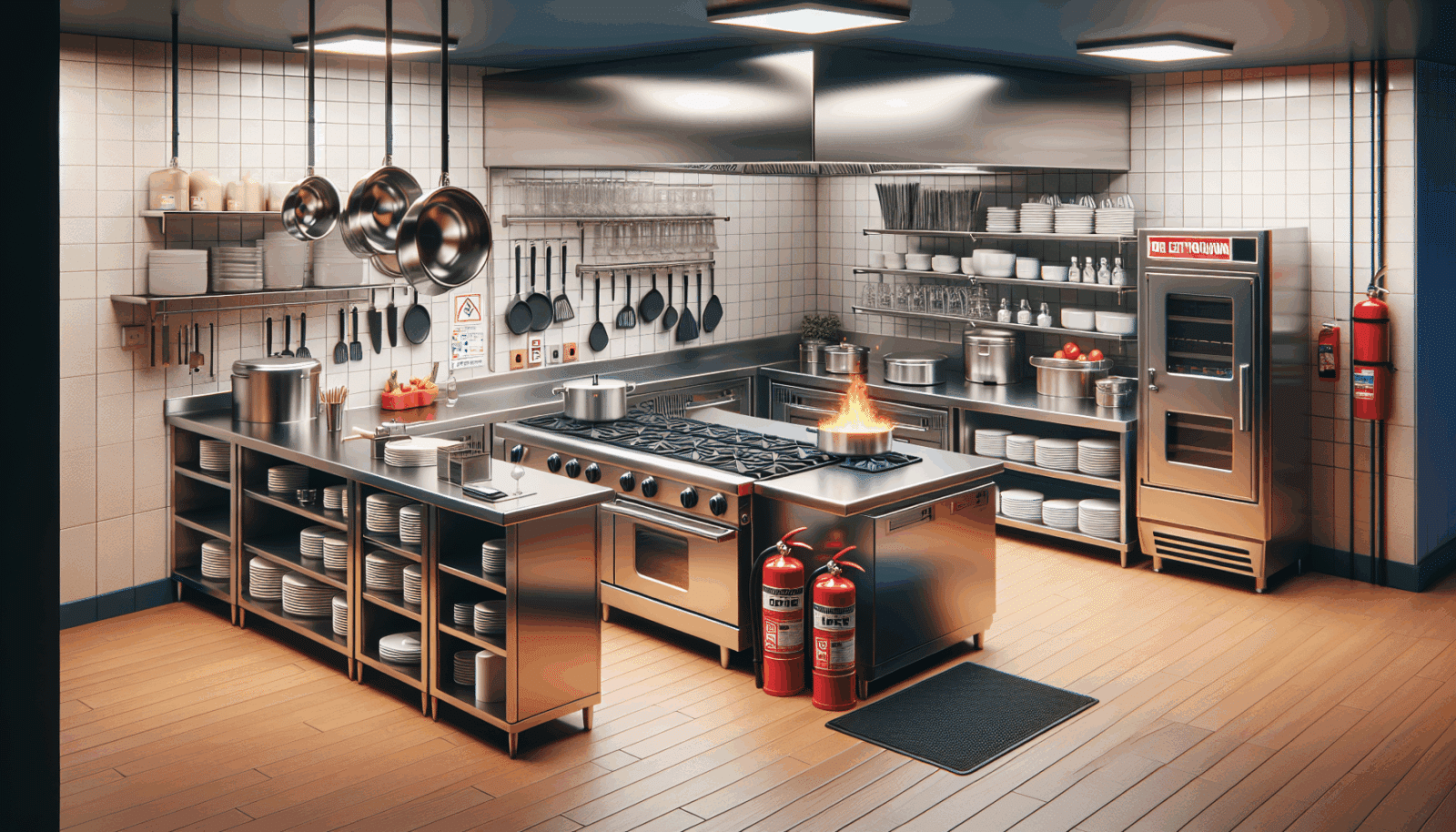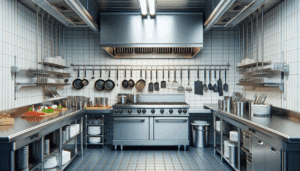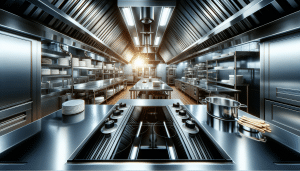Kitchen fires can be devastating, and one common cause is the buildup of Grease and grime in your kitchen hood. We at Utah Hood Cleaning understand this concern, and that’s why we’ve crafted this step-by-step guide to help homeowners like you avoid such a disaster. This article will provide you with practical tips and techniques for maintaining a clean and safe kitchen hood. Let’s dive in and keep your home safe and spotless!
Understanding the Importance of Kitchen Hood Cleaning
Keeping your kitchen hood clean is more than just a matter of aesthetics. A dirty hood can become a significant fire hazard due to accumulated grease, which can ignite under high heat. By maintaining a clean hood, you not only improve your kitchen’s air quality but also significantly reduce the risk of a fire.
Regular cleaning also extends the lifespan of your kitchen appliances. A clean hood allows for better airflow and efficiency, which means your kitchen will stay cooler and your equipment will work more effectively.
How Often Should You Clean Your Kitchen Hood?
The frequency of cleaning depends on how often you use your kitchen. For avid cooks, we recommend a thorough cleaning once every three months. If you cook less frequently, a bi-annual cleaning should suffice. However, always keep an eye on your hood for any grease buildup and clean it as needed.
Some signs that indicate it’s time to clean your kitchen hood include visible grease, poor ventilation, and unpleasant odors. Addressing these signs promptly can prevent more significant issues down the line.
Gathering the Right Cleaning Supplies
Before you start cleaning, gather all the necessary supplies. Having everything ready will make the process more straightforward and efficient. Here’s a list of what you’ll need:
- Degreaser: A high-quality degreaser will help break down tough grease and grime.
- Soft cloths or sponges: These are essential for wiping away loosened grease and cleaning surfaces.
- Hot water: Hot water is effective in dissolving grease and making the cleaning process easier.
- Scrub brush: A brush with stiff bristles can help scrub away stubborn grease deposits.
- Protective gloves: Wear gloves to protect your hands from harsh chemicals and hot water.
With these supplies on hand, you’re ready to tackle the cleaning process.
Step-by-Step Cleaning Process
To start, ensure the kitchen hood is turned off and has cooled down completely. Begin by removing the filters, which can usually be slid or popped out. Place the filters in a sink filled with hot soapy water to soak while you work on the hood’s interior and exterior surfaces.
Next, spray the degreaser on the hood’s surfaces, including the interior, and let it sit for a few minutes. Use the soft cloths or sponges to wipe away the grease. For stubborn spots, utilize the scrub brush. Once you’ve cleaned the surfaces, rinse the cloths or sponges in hot water and give the hood a final wipe down.
Cleaning the Filters
While the filters are soaking, most of the grease will loosen up. After they have soaked, use a scrub brush to clean off any remaining grease. Rinse the filters thoroughly with hot water and let them air dry before reinstalling.
Replacing clean and dry filters is crucial to maintain efficient airflow. Dirty filters restrict airflow, causing your hood to work harder and increasing the risk of fire.
Preventative Measures to Avoid Grease Buildup
Prevention is always better than cure. Here are some tips to keep your kitchen hood in good condition:
- Regular surface cleaning: Wipe down your kitchen hood’s surfaces after each cooking session to prevent grease buildup.
- Use a splatter guard: A splatter guard can reduce the amount of grease that reaches your hood by capturing grease before it becomes airborne.
- Cook at lower temperatures: Lower cooking temperatures produce less grease, which means less will accumulate in your hood.
- Maintain good ventilation: Turn on your kitchen hood before you start cooking and keep it running for a few minutes after you’re done to clear out any lingering grease particles.
- Regular professional cleaning: Schedule a professional cleaning at least once a year to ensure your kitchen hood is thoroughly inspected and cleaned.
Knowing When to Call a Professional
While regular cleaning can be done by homeowners, some situations might require professional expertise. If you notice your hood is not functioning correctly despite regular cleanings, or if there is persistent grease buildup you can’t remove, it’s time to call the experts.
Professional cleaners have specialized equipment and know-how to tackle even the most stubborn grease and grime. They can also inspect your hood and ductwork for any potential fire hazards, ensuring your kitchen is safe.
The Benefits of Professional Cleaning Services
By opting for professional cleaning services, you benefit from their extensive knowledge and experience. Professional cleaners can reach areas that are difficult or impossible to clean with standard household tools. They use industrial-grade cleaners that are more effective at removing built-up grease and preventing future accumulation.
Furthermore, having your kitchen hood professionally cleaned can provide peace of mind. You’ll know that your hood and ventilation system are in excellent working condition, reducing the risk of fire and improving your kitchen’s overall cleanliness.
DIY Tips for Ongoing Maintenance
Even with regular professional cleanings, there are some DIY maintenance tips you can follow to keep your kitchen hood in top shape. For instance, regularly change or wash reusable filters if your hood contains them. Use the cooking settings outlined in your hood’s manual to ensure proper functioning.
Additionally, keep an eye on the overall cleanliness of your kitchen. A clean kitchen helps to prevent grease from spreading and settling on your appliances, making your cleaning tasks much more manageable.
Safety First: Handling Cleaning Chemicals
When handling cleaning chemicals, always prioritize safety. Use degreasers and cleaners in well-ventilated areas to avoid inhaling fumes. Wear protective gloves to prevent skin irritation, and always follow the manufacturer’s instructions for the proper usage and dilution of cleaning agents.
Store all cleaning products out of reach of children and pets. Proper storage ensures that these potentially harmful chemicals don’t pose a risk to your household.
The Long-Term Benefits of Regular Hood Cleaning
Regular kitchen hood maintenance isn’t just about preventing fires. It also contributes to a healthier and more pleasant indoor environment. Clean hoods improve air quality by removing smoke, odors, and grease particles from the air. This is particularly important for those with respiratory issues.
Moreover, a clean kitchen hood can save you money in the long run by preventing costly repairs and improving the efficiency of your kitchen appliances. Reduced grease buildup means your kitchen hood and other equipment won’t have to work as hard, leading to lower energy consumption and utility bills.
For comprehensive, professional hood cleaning services, reach out to us by phone at 801-853-8155 or Request a Free Quote. Let’s keep your kitchen safe and sparkling!




